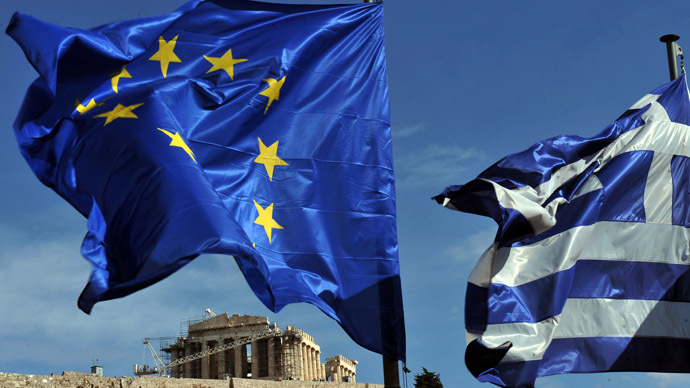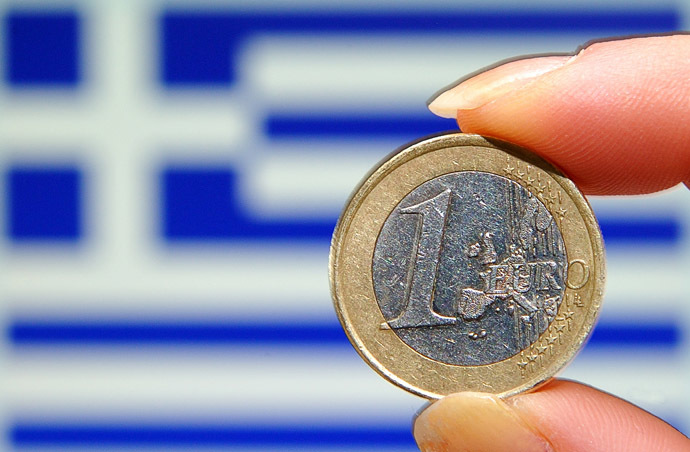'Greek EU Presidency in 2014 won’t change anything'

The EU Presidency means for Greece only delegations from the European Central Bank, from the IMF and European Commission in control of Greek ministries, but the country will remain in ruins, journalist Aris Chatzistefanou told RT.
RT:Greece takes over the EU Presidency in 2014. Do you think the country in its present shape is capable of leading the entire union?
Aris Chatzistefanou: You know, to say that a country like Greece can lead the entire European Union is like saying that a banana republic in Latin America of the 1970s could have changed the foreign policy of the United States. There is nothing that Greece can do and that’s just a circus of people pretending to be leading this union. We have here delegations from the European Central Bank, from the IMF and European Commission in control of Greek ministries, so there is nothing to change. At the physiological level many people in Greece believe that Europeans don’t want to see riots in the streets, they don’t want to see a government that will collapse in the next few months, so they will step back from the austerity policy and what the German banks and big financial institutions demand from Greece. I wouldn't bet on that. Don’t forget that the Czech Republic when they had the EU Presidency, the government just collapsed. I’m afraid the same thing can happen in Greece too.
RT:What can the EU expect from Greece holding the EU Presidency?
AC: I believe Greece can give some lessons on austerity measures in a time of crisis and when a country has a huge public debt, this austerity can lead only to disaster. In that sense we can teach some lessons to other European countries and especially countries in the European periphery. But there is nothing else for the Europeans to expect from Greece at the moment. I would repeat that this European Presidency cannot really make any changes in Europe, in a European Union that is controlled primarily by Berlin and by some big financial institutions in the core of the European Union.
RT:The Greek government is promising timid growth in 2014. Is that really so or is it just a PR move?
AC: I can give you the status of the Greek economy just by showing the skyline of Athens. Right now the city is covered by smog and this is happening because people in Athens don’t have enough money to buy fuel or to pay electricity bills to keep themselves warm in the winter time. That’s happening for the first time since World War II. I think that’s the right image to project to Europe and not what the government’s propaganda wants to promote - that we are having a primary surplus in the budget or that this recession after six years will stop. If I had to give some figures for 2014, I would say that we will have unemployment around 30%, 60% in youth unemployment, the public debt will keep skyrocketing and the poverty will be in the worst condition for the last three generations of Greeks.
RT:Greeks have long been criticized for living beyond their means. Although unpopular, isn't austerity the only way out of the crisis?
AC: What people in Europe should realize and the Greek government too is that this debt is not sustainable and it wasn't sustainable from 2010. So there is nothing to expect if there is not actually a default on our debt. Any other policy of austerity, even the so-called ‘haircut’, by the Europeans and Germany who will realize that after the elections we should have a change, and probably a ‘haircut’, but even that wouldn't be enough. We need a default, no matter what the government is saying, no matter what European executives are saying at the moment.

RT:Greece has approved a new budget plan with even more austerity cuts. Are more cuts likely to lead to even bigger social protest than there is now?
AC: I’m afraid that there are two critical points that could change the face of Athens and probably we could see some riots, the same riots that we have seen in Argentina after the financial collapse of 2000-2001. The first is if the government decides to start withdrawing money from bank accounts of citizens in the same way that happened in Cyprus, and the second thing would be to start home foreclosures. In these two scenarios, I think, the population cannot stand anymore. We will probably have even riots in the center of Athens.
RT:Greece is getting cash injections from the EU one after another. Will the country ever be able to repay its debt?
AC: You have to realize that this money has never come to Greece. Greece was used as a laundry machine for capital of other European countries. The German taxpayers, for example, they were paying huge amounts that were coming to Greece, but there was not 1% of this money staying for various reasons in the Greek economy. It was going back to big financial institutions and especially big banks in Germany. So what we were saying for many years now it’s “Please, stop saving us. Please, stop pretending that you are giving money to the Greek economy, while at the same time what you really do is destroying infrastructure and creating junky loans that cannot survive without this continuous flow of capital”.
RT:Billions of dollars have been spent during the past 5 years to keep the economy afloat. Was the money spent wisely?
AM: Most of the money that we are receiving in Greece is to repay the older debt and the loans that we took out many years ago and a big part of this debt was characterized by many economists as being odious or illegal. What the Europeans were trying, and I’m talking about the EU and the European Central Bank, what they were trying to do is to change the characteristic of the loans. They were giving money that they were taking back to change the fact that almost 90 percent to 95 percent of the Greek debt was created under Greek law and that creates some opportunities in case of default in the way that you renegotiate your debt. What they did was to change this law and to put it under English law, which is the worst case scenario for the poor countries like Greece.
The statements, views and opinions expressed in this column are solely those of the author and do not necessarily represent those of RT.
The statements, views and opinions expressed in this column are solely those of the author and do not necessarily represent those of RT.












